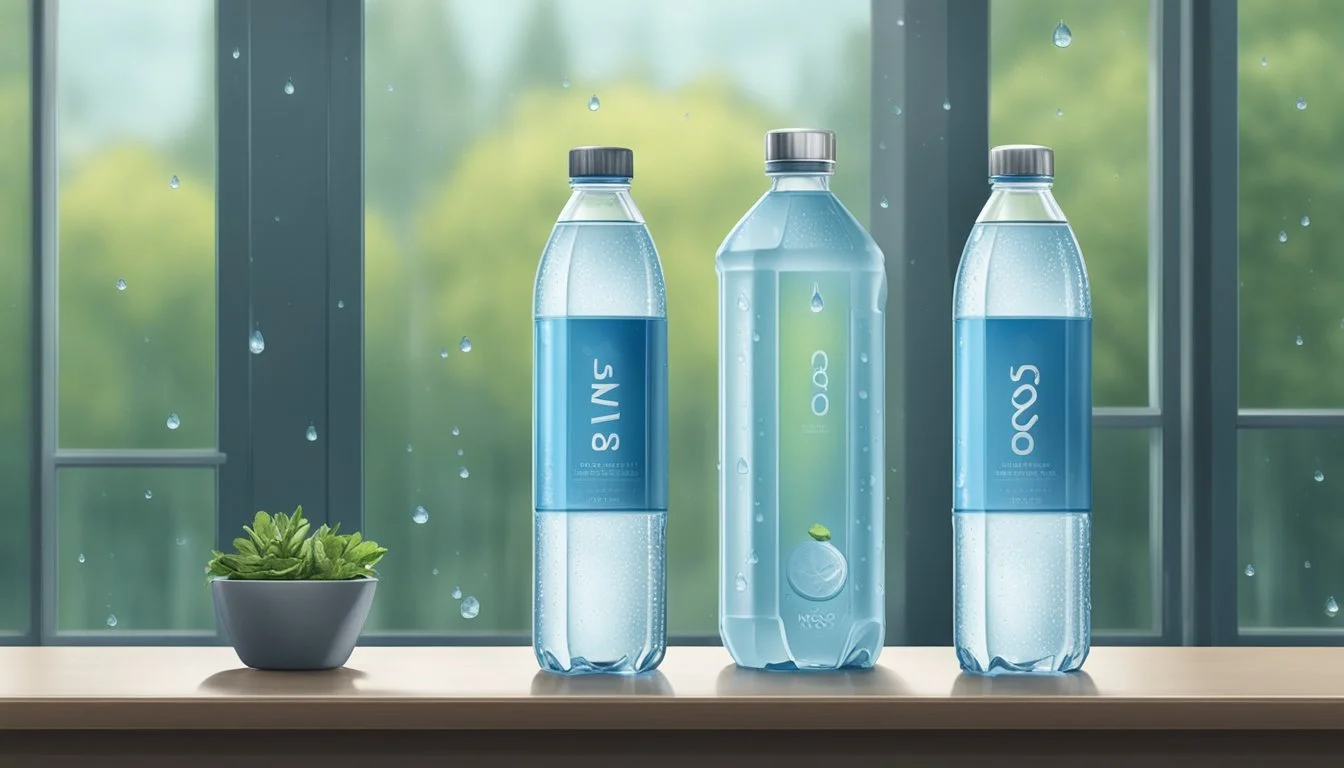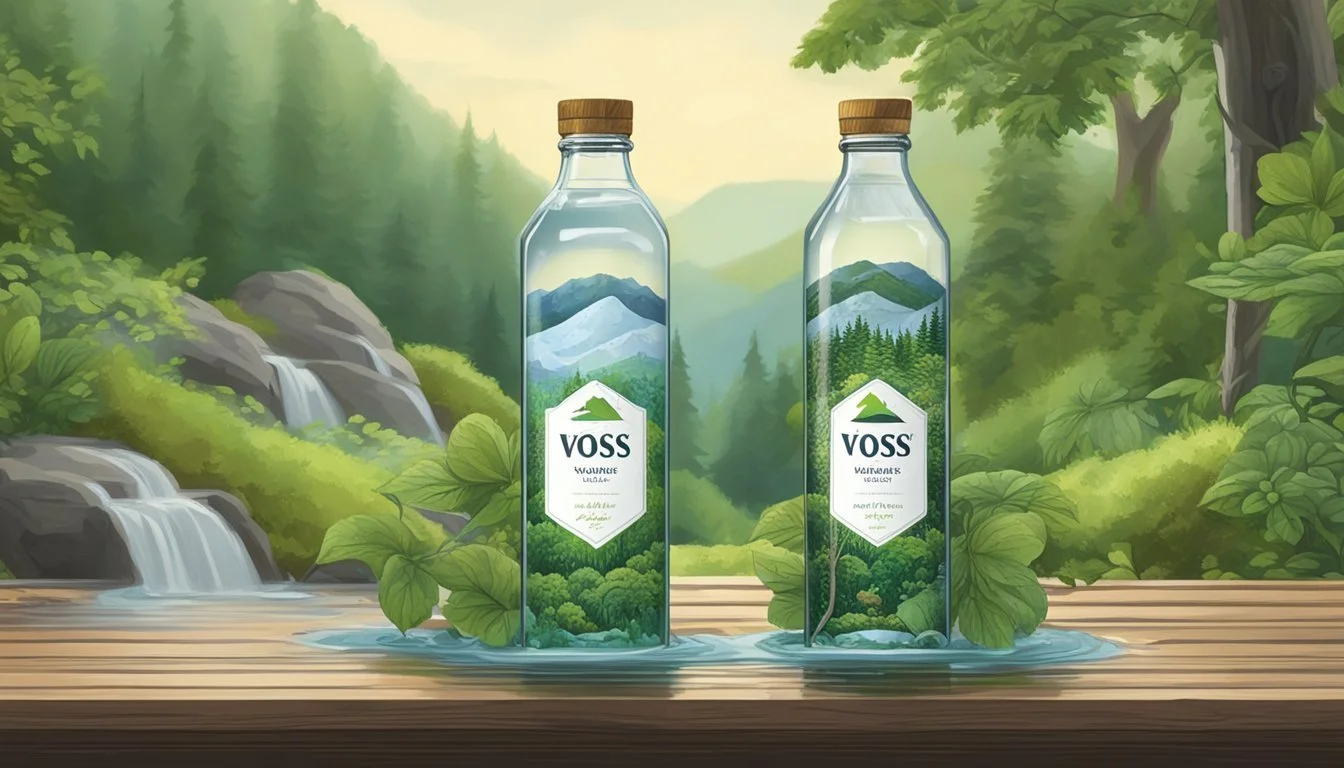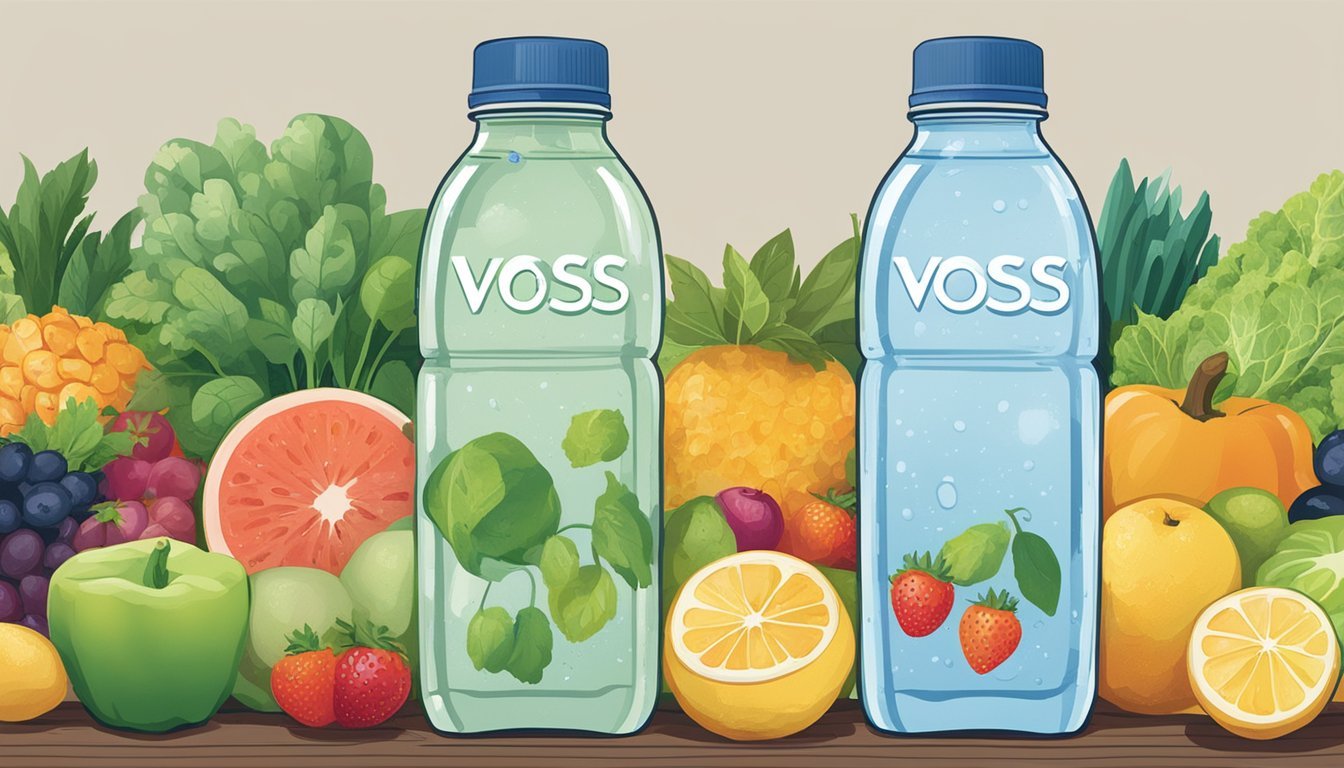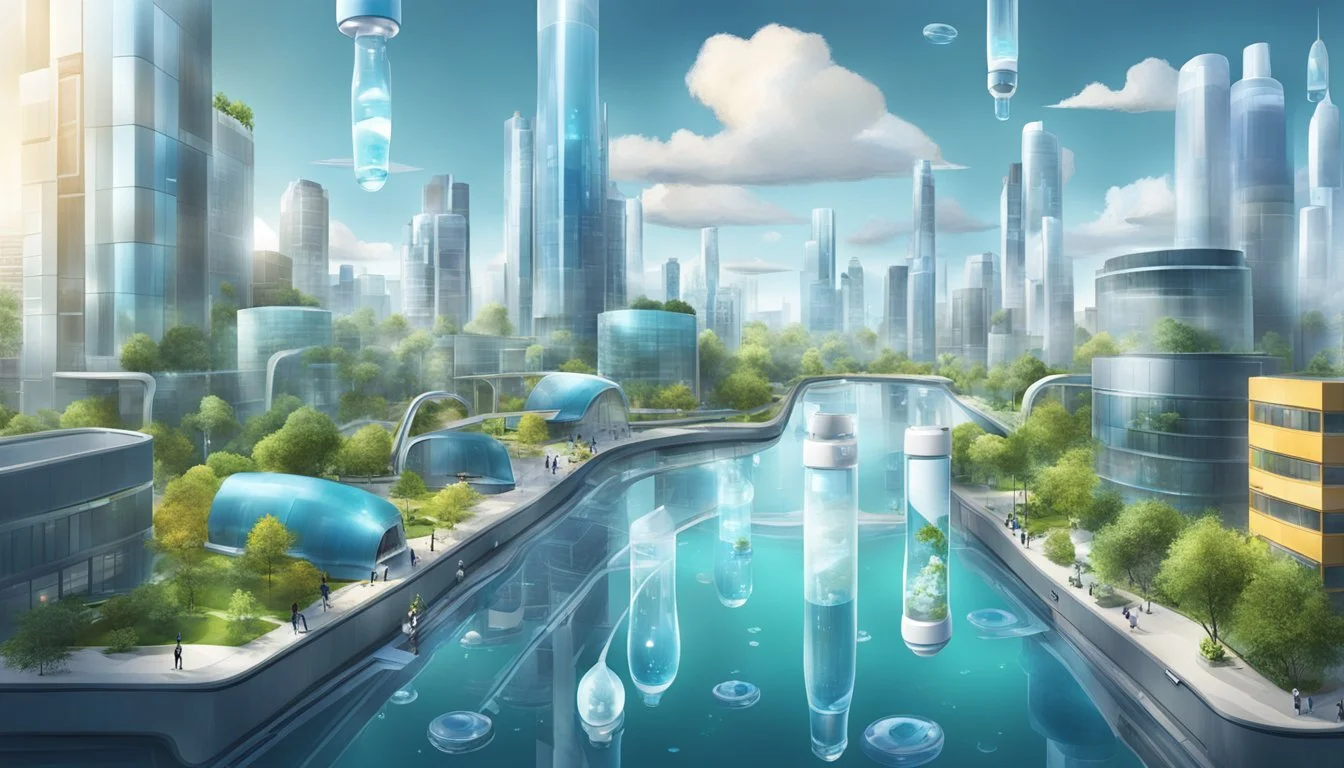Voss vs. Richard’s Rainwater
A Comparative Analysis of Bottled Waters
When it comes to bottled water, Voss and Richard's Rainwater stand out for their distinct qualities. Sourced from Southern Norway, Voss is renowned for its pure, natural spring water, which boasts a crisp and refreshing taste. On the other hand, Richard's Rainwater offers a unique experience as it is collected directly from rain, ensuring a soft and naturally clean flavor.
For those who prioritize a clean, natural taste, Richard's Rainwater provides a unique and refreshing option. This rain-harvested water ensures a pristine quality that sets it apart from many other bottled waters on the market. Many consumers appreciate its environmentally friendly approach, which emphasizes sustainability.
In comparison, Voss's appeal lies in its sophisticated branding and elegant bottle design, making it a popular choice for those who seek both style and substance in their drinking water. Its reputation for being pure and free of contaminants makes it a steady favorite among premium bottled waters.
Understanding Bottled Water
Bottled water encompasses various types, each with its own sources and treatment processes. Regulations ensure the safety and quality of bottled water, differentiating it from tap water.
Types of Bottled Water
Mineral Water: This type is sourced from natural springs and contains minerals like calcium, magnesium, and sodium. These minerals must remain constant and naturally occurring at the source.
Spring Water: Originating from underground formations, spring water flows naturally to the surface or is collected through a borehole tapping into the underground source.
Purified Water: This category includes water that has undergone processing, such as distillation, deionization, or reverse osmosis. The source can be either local tap water or groundwater.
Rainwater: Bottled rainwater, such as Richard’s Rainwater, is collected directly from rainfall. It claims to be free from contaminants due to natural filtration and is marketed for its pure, crisp taste.
Bottled Water Standards
Bottled water is regulated to ensure safety and quality. In the United States, the Food and Drug Administration (FDA) oversees these standards, setting requirements for processing, bottling, labeling, and distribution.
Mineral Content: For mineral water, the mineral content must be intact and consistent. Labeling must accurately reflect these attributes.
Source Verification: Spring water must be verified to originate from a natural spring, maintaining the water’s natural composition.
Purity Requirements: Purified water must meet strict standards for purity, often requiring advanced treatment methods like UV treatment or reverse osmosis.
Testing Protocols: Bottled water must undergo regular microbiological testing to confirm its safety for consumption. This includes testing for potential contaminants.
Regulatory distinctions between bottled and tap water lie in the source, treatment, and labeling requirements, with bottled water often adhering to more stringent standards for distribution and consumer safety.
Water Sources and their Impact
Understanding the origin and collection method of bottled water can reveal much about its quality and environmental impact. Both Voss and Richard's Rainwater have unique approaches, influencing their purity and appeal to consumers.
Rainwater Collection and Use
Richard's Rainwater is 100% potable and originates from collected rainwater. This method reduces reliance on traditional water sources, making it environmentally friendly. Collected rainwater undergoes stringent filtration processes to ensure safety and purity.
By capturing rainwater directly, it eliminates many contaminants typically found in groundwater and spring sources. This practice also helps conserve local water supplies, making it a sustainable choice for drinking water.
Spring Water Extraction
Voss, on the other hand, sources its water from natural springs in Southern Norway. Spring water is naturally filtered through layers of rock, which can impart a unique mineral composition. This natural filtration process often results in a clean, crisp taste.
Spring extraction, however, can affect local ecosystems and groundwater levels if not managed responsibly. Unlike rainwater collection, tapping into springs requires careful monitoring to avoid depletion. The water's journey through various geological formations before reaching the bottling stage ensures it remains pure and rich in essential minerals.
Both methods have significant impacts on quality, sustainability, and consumer health. Choosing between them depends on priorities such as taste preference, environmental impact, and source reliability.
The Purity and Quality of Water
Purity and quality are critical factors when comparing Voss and Richard’s Rainwater. Examining their filtration processes and rigorous testing can provide insight into which brand offers superior water.
Filtration and Purification Process
Voss sources its water from a natural spring in Southern Norway. The filtration process involves microfiltration, reverse osmosis, and ultraviolet exposure. This multimodal approach ensures the water is free of contaminants like chlorine and fluoride.
Richard’s Rainwater collects rain directly, filtering it through a proprietary system. This method captures rain at its purest, avoiding common contaminants found in ground or tap water. The process includes carbon filtration and UV treatment, ensuring a clean and pure final product. Both brands prioritize removing unwanted substances, but their methods reflect different philosophies about achieving water purity.
Testing and Safety
Voss rigorously tests its water to meet U.S. Federal, State, Norwegian, and International quality standards. The Total Dissolved Solids (TDS) levels are notably low, contributing to its clean taste. Frequent testing ensures that no illegal contaminants compromise the water quality.
Richard’s Rainwater also adheres to stringent safety protocols. The water undergoes regular testing for bacteria, viruses, and other potential contaminants. The brand's commitment to high quality standards involves third-party quality checks, ensuring the water remains pure and safe for consumers. Safety measures ensure both brands maintain high levels of trust and water quality integrity.
Branding and Market Presence
Richard's Rainwater and Voss Water have distinct approaches to branding and market presence, each leveraging unique elements to reach their target audiences effectively.
Richard Heinichen and Richard’s Rainwater
Richard Heinichen founded Richard’s Rainwater in 1994 in Austin, Texas. The company is known for its innovative approach of converting rainwater into potable water.
Richard's Rainwater markets itself as the first company in the United States to provide bottled rainwater. Their branding emphasizes sustainability and environmental consciousness.
The packaging and messaging highlight the purity and eco-friendly aspects of the product. Richard’s Rainwater is available in select grocery stores and retailers, mainly in regions with a strong focus on environmental sustainability.
Voss Water's Market Strategy
Voss Water has positioned itself as a luxury brand since its inception in 2001. Headquartered in New York City, Voss sources its water from an underground aquifer in Southern Norway, which is protected from pollutants.
The company's branding focuses on high-end, premium quality. Voss employs rigorous purification processes and promotes a distinct mineral profile.
Voss Water's distribution is selective, targeting high-end retailers, gourmet grocery stores, and exclusive venues like luxury hotels and restaurants. This strategy has helped Voss build a prestigious market presence and strong brand recognition worldwide.
Both brands leverage their unique selling points to carve out a niche in the competitive bottled water market, driving sales through targeted marketing and selective distribution channels.
Environmental Concerns and Sustainability
Environmental impact is a key consideration when comparing Voss and Richard’s Rainwater. Both brands emphasize eco-conscious practices, but their approaches differ significantly.
Packaging and Materials
Voss predominantly uses glass bottles, which are recyclable and have a lower environmental impact compared to plastic. Glass is inert, doesn't leach chemicals into the water, and its aesthetic appeal is a bonus. However, it's heavier and more energy-intensive to transport, contributing to a higher carbon footprint.
In contrast, Richard’s Rainwater utilizes plastic bottles but positions itself as an environmentally friendly option through the use of 100% recycled PET. While plastic can be perceived as less sustainable, using recycled materials reduces waste and supports a circular economy.
Sustainability Initiatives
Richard’s Rainwater collects and purifies rainwater. This renewable water source minimizes reliance on depleting natural aquifers, making it a net-positive impact choice. The company is devoted to sustainability, actively contributing to local communities by donating water.
Voss, while less vocal about specific community initiatives, has invested in reducing its carbon footprint. Their bottling plants incorporate renewable energy sources and efficiency measures. Yet, the brand’s primary sustainability thrust lies in its high-quality, recyclable packaging.
Both brands have set ambitious goals to enhance sustainability, demonstrating a commitment to reducing environmental impact in different yet meaningful ways.
Taste and Health Considerations
Voss and Richard’s Rainwater have distinct characteristics concerning taste and potential health benefits. Their differences extend to the choice between still and sparkling options and the variety of beneficial minerals they contain.
Still vs. Sparkling Water
Voss is well-known for offering both still and sparkling water options. The still water has a clean, crisp taste attributed to its pristine Norwegian aquifer source. The sparkling variant is carbonated to provide a refreshing effervescence, which may be more appealing to those who enjoy fizzy drinks.
Richard’s Rainwater, sourced from collected rainwater, is also available in both still and sparkling forms. The still water has a naturally smooth flavor, often described as purer than other sources due to minimal processing. Its sparkling water is mildly carbonated, offering a gentle fizz.
Key elements to compare:
Taste: Voss is often noted for its pure, clean taste, whereas Richard’s Rainwater is praised for its smoothness.
Variety: Both brands offer still and sparkling options to cater to different preferences.
Health Benefits and Concerns
Both Voss and Richard’s Rainwater highlight health benefits linked to their mineral content. Voss water contains a balanced mix of minerals like calcium, magnesium, and bicarbonates. These contribute to hydration and may support bone health and metabolic functions.
Richard’s Rainwater focuses on purity, with minimal mineral content, ensuring it remains free from pollutants and chemicals often found in other sources. This makes it a suitable option for those looking for ultra-pure water with no added electrolytes.
Key Health Points:
Minerals: Voss contains beneficial minerals such as calcium and magnesium.
Purity: Richard’s Rainwater is prized for its ultra-purity, with minimal electrolytes.
Consumer Experience
Voss and Richard's Rainwater offer distinct experiences, particularly concerning their packaging and presence in retail outlets. Consumers should note differences in convenience and presentation that can influence their choice between the two bottled water brands.
Availability and Accessibility
Voss bottled water is widely recognized for its sleek glass bottles, which are available in many high-end grocery stores like Whole Foods. This brand is also frequently found in boutique stores and upscale restaurants, offering a premium experience. The glass bottles are not only stylish but also environmentally conscious, appealing to eco-friendly consumers.
Richard’s Rainwater, on the other hand, emphasizes sustainability with recyclable packaging, aiming to minimize environmental impacts. While this brand might not have as extensive retail distribution as Voss, it is available in select grocery chains like Kroger. Its focus on eco-friendly packaging and rainwater collection process attracts a niche market of environmentally conscious shoppers who may prioritize these values over broader accessibility.
Both brands cater to specific consumer preferences, particularly those who appreciate sustainability, convenience, and the quality of packaging.
Comparative Analysis: Voss vs. Richard's Rainwater
Voss and Richard's Rainwater are two premium bottled water brands known for their unique sourcing and purification processes. This section examines their varieties, pricing, and consumer perceptions.
Product Range and Varieties
Voss offers both still and sparkling waters, presented in sleek glass and plastic bottles. Originating from Southern Norway, it is known for its minimalist design. Their product range includes flavored sparkling water variations such as lemon cucumber and tangerine lemongrass.
Richard's Rainwater focuses on sustainability, collecting rainwater, filtering, and bottling it. Their offerings include still and sparkling options. They emphasize eco-friendly packaging and providing a naturally pure product free from contaminants due to a unique purification process.
Pricing and Value
Voss water is positioned as a luxury brand, often carrying a higher price point. A typical 800ml bottle can range from $2.50 to $3.50. The premium packaging and the brand's reputation for purity and taste justify this cost for many consumers.
Richard's Rainwater is also in the premium segment, with prices approximately $1.50 to $2.50 for a 500ml bottle. The brand appeals to environmentally conscious buyers who value sustainably sourced water. Although less expensive than Voss, it similarly positions itself as a premium product.
Consumer Perceptions and Reputation
Voss is associated with luxury and refinement. Many consumers are drawn to its aesthetically pleasing bottles and the idea of drinking water from an untouched natural aquifer. The brand is often viewed as a status symbol.
Richard's Rainwater enjoys a positive reputation among environmentally engaged consumers. Its commitment to sustainability and purity resonates well with those who prioritize ecological impact. It is generally perceived as innovative in the bottled water industry.
Both brands focus on providing high-quality, pure drinking water but appeal to different customer bases. Voss is seen as more luxurious, while Richard's Rainwater emphasizes sustainability.
The Future of Bottled Water
The bottled water industry is evolving rapidly, driven by technological advancements and environmental concerns. Both innovation and increasing competition from emerging brands are shaping its future landscape.
Emerging Brands and Competitors
Emerging brands like Richard's Rainwater are pioneering eco-friendly water harvesting techniques. They capture rainwater, which is then meticulously filtered to ensure purity. This method reduces dependence on municipal water supplies and promotes sustainability.
Technology plays a crucial role in these processes. Innovations in filtration systems enhance water quality and safety. Competitors, including traditional brands like Voss, are also incorporating similar technologies to meet consumer demand for cleaner, healthier water options. These trends indicate a dynamic future for the bottled water industry, emphasizing sustainability and technological innovation.
More About Voss
More About Richard’s Rainwater
Acqua Pana vs Richard's Rainwater: Which Bottled Water is Better?
Alkaline88 vs Richard's Rainwater: Which Bottled Water is Better?
Antipodes vs Richard's Rainwater: Which Bottled Water is Better?
Aqua Carpatica vs Richard's Rainwater: Which Bottled Water is Better?
Aquafina vs Richard's Rainwater: Which Bottled Water is Better?
Arrowhead vs Richard's Rainwater: Which Bottled Water is Better?
Boxed Water vs Richard's Rainwater: Which Bottled Water is Better?
Cascade Mountain vs Richard's Rainwater: Which Bottled Water is Better?
Castle Rock vs Richard's Rainwater: Which Bottled Water is Better?
Cirro vs Richard's Rainwater: Which Bottled Water is Better?
Core Hydration vs Richard's Rainwater: Which Bottled Water is Better?
Crystal Geyser vs Richard's Rainwater: Which Bottled Water is Better?
Deer Park vs Richard's Rainwater: Which Bottled Water is Better?
Erewhon vs Richard's Rainwater: Which Bottled Water is Better?
Essentia vs Richard's Rainwater: Which Bottled Water is Better?
Eternal vs Richard's Rainwater: Which Bottled Water is Better?
Ethos vs Richard's Rainwater: Which Bottled Water is Better?
Evian vs Richard's Rainwater: Which Bottled Water is Better?
Hawaii Volcanic vs Richard's Rainwater: Which Bottled Water is Better?
Hawaiian Springs vs Richard's Rainwater: Which Bottled Water is Better?
Ice Mountain vs Richard's Rainwater: Which Bottled Water is Better?
Icelandic Glacial vs Richard's Rainwater: Which Bottled Water is Better?
Just Water vs Richard's Rainwater: Which Bottled Water is Better?
Kroger vs Richard's Rainwater: Which Bottled Water is Better?
LIFEWTR vs Richard's Rainwater: Which Bottled Water is Better?
Liquid Death vs Richard's Rainwater: Which Bottled Water is Better?
Mananalu vs Richard's Rainwater: Which Bottled Water is Better?
Mountain Valley Spring Water vs Richard's Rainwater: Which Bottled Water is Better?
Nestle Pure Life vs Richard's Rainwater: Which Bottled Water is Better?
Origin vs Richard's Rainwater: Which Bottled Water is Better?
Ozarka vs Richard's Rainwater: Which Bottled Water is Better?
Penta vs Richard's Rainwater: Which Bottled Water is Better?
Perrier vs Richard's Rainwater: Which Bottled Water is Better?
Poland Spring vs Richard's Rainwater: Which Bottled Water is Better?
Purely Sedona vs Richard's Rainwater: Which Bottled Water is Better?
Richard's Rainwater vs 1907water: Which Bottled Water is Better?
Richard's Rainwater vs 7-Select: Which Bottled Water is Better?
Richard's Rainwater vs Action: Which Bottled Water is Better?
Richard's Rainwater vs Big Chill: Which Bottled Water is Better?
Richard's Rainwater vs Big Win: Which Bottled Water is Better?
Richard's Rainwater vs BodyArmor: Which Bottled Water is Better?
Richard's Rainwater vs CBD Living: Which Bottled Water is Better?
Richard's Rainwater vs Crystal Lake: Which Bottled Water is Better?
Richard's Rainwater vs Dasani: Which Bottled Water is Better?
Richard's Rainwater vs Essence pH10: Which Bottled Water is Better?
Richard's Rainwater vs HFactor: Which Bottled Water is Better?
Richard's Rainwater vs Kirkland Signature: Which Bottled Water is Better?
Richard's Rainwater vs Open Water: Which Bottled Water is Better?
Richard's Rainwater vs Ophora: Which Bottled Water is Better?
Richard's Rainwater vs Proud Source: Which Bottled Water is Better?
Richard's Rainwater vs Pure Life: Which Bottled Water is Better?
Richard's Rainwater vs Ramona: Which Bottled Water is Better?
Richard's Rainwater vs Refreshe: Which Bottled Water is Better?
Richard's Rainwater vs Simple Truth: Which Bottled Water is Better?
Richard's Rainwater vs Skyra: Which Bottled Water is Better?
Richard's Rainwater vs Talking Rain AQA: Which Bottled Water is Better?
Richard's Rainwater vs The Well: Which Bottled Water is Better?
Richard's Rainwater vs Weird Water: Which Bottled Water is Better?
Richard's Rainwater vs Whole Foods 365: Which Bottled Water is Better?
Richard's Rainwater vs Zenwtr: Which Bottled Water is Better?
San Pellegrino vs Richard's Rainwater: Which Bottled Water is Better?
Smartwater vs Richard's Rainwater: Which Bottled Water is Better?
Solan de Cabras vs Richard's Rainwater: Which Bottled Water is Better?
Starkey vs Richard's Rainwater: Which Bottled Water is Better?
Tahoe vs Richard's Rainwater: Which Bottled Water is Better?
Topo Chico vs Richard's Rainwater: Which Bottled Water is Better?
Tru Alka vs Richard's Rainwater: Which Bottled Water is Better?
Volvic vs Richard's Rainwater: Which Bottled Water is Better?
Waiakea vs Richard's Rainwater: Which Bottled Water is Better?
Whole Foods Italian Still Mineral water vs Richard's Rainwater: Which Bottled Water is Better?
Zephyrhills vs Richard's Rainwater: Which Bottled Water is Better?








